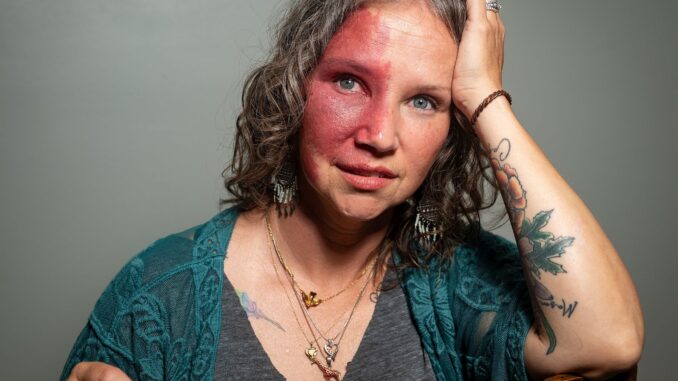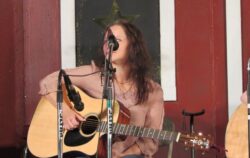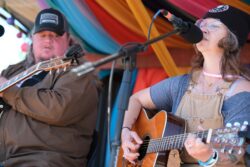
There is no happiness if you don’t know what sadness feels like.
Why are there more sad songs than happy ones? This is one of those questions for the ages, like why can’t you see the wind? Or what makes a man love one woman and not another (use whatever gender identity that floats your boat)? For the answer to the first question, we turn to an expert witness. Who would that be, you ask? Well, obviously, a professional songwriter.
“I think people identify more with sad songs because joy is fleeting”, said Heather Little, the Lindale, Texas, songwriter, singer and mom. “I think writing a happy song is like trying to paint a picture of lightning while it’s happening. If you try, you miss it the same as trying to take apart what it means to be happy and reassemble that into a song. There is no happiness and no joy if you don’t know what it’s like to feel sadness. And really, there is a lot of joy to be found in those sad places”.
You offer Little a penny for her thoughts on the subject, and her insights will double your money.
“Think of a person who doesn’t have a penny to his name”, she put forth, “walking along on his sad journey. He looks down and sees a penny on the ground. Well, someone who has a million gillion bucks won’t even notice the penny, but if you’re sad, you see the penny, and you’re grateful for that little flash of lightning and pick it up. That penny feels like a billion volts of joy coursing through your life. If you are oblivious to the sadness, you won’t even notice the bright spots. It’s so fragile. That’s my 2 cents”.
Little was born (in 1976) to be a songwriter. Her mother had a little clock radio that you had to fiddle with the dial to tune in a station. It was the same driving around to where you would start to lose a station. “If the station didn’t come in good, you just dealt with it. The static didn’t matter much. If you already knew the song, then you could still sing along. You just trusted in finding the next station. Never once did I think I would flip the radio on, and something that I loved wouldn’t come out of it. I knew this song will fix me, and whatever I need is in this little box“.
Her introduction to music by her family included artists such as Rickie Lee Jones, Lovin’ Spoonful, Bread, and Janis Joplin. “Mom always had an 8-track player in the car”, she recalled. “I was into R&B, and when I brought a Prince album to school, my music teacher was not super thrilled. In grade school music class, I would make up songs because I thought it was natural for people to do that. That’s when I learned making up songs was not normal”.
.At home, she had a cassette player and would record her favourite songs on the radio. “Sometimes the DJs would talk over the intros and the outros, and that drove me nuts”, Little remembered while scowling. “I just wanted to record the music because I didn’t have access to any record I wanted. You had to have money to go to the store and buy them unless it was a birthday or Christmas. My dad had a big record cabinet, but we weren’t allowed to touch it, so we would sneak in to play those tapes and records when he wasn’t home. He got home at 4:32 every day, and we knew everything had to be put back exactly the way he left it”.
When Little turned 16, her mother picked her up from school and took her to the next town over to get a driver’s license. The choice was to either take Driver’s Ed or have a Texas State Trooper sit in the car as you did the road test. The thought was terrifying, so she took the class. Years later, she wrote a song called ‘Bones’, which gets into the experience of being at that awkward age. “There ain’t nothing sweet about 16 / Went to the dance with a Christian boy / My homemade dress and his ’82 Ford“.
“I wouldn’t want to be 16 again for all the tea in China”, she asserted. “There’s no amount of money I would take to have to relive those years. You think this wealth of knowledge is going to be magically bestowed upon you, and you’ll suddenly understand everything that you didn’t while you were 15. Everything will become clear and fix all your interpersonal relationships. None of that is true”.
In addition to making up songs and singing to the radio, she wrote poetry and journaled. For her, that was a potent combination, just lacking a guitar. So, she adopted her mom’s guitar, a 1969 J-50 Gibson. “I would just goof around until it sounded like I wanted. I loved that guitar and took it everywhere I moved, and I moved a lot”.
Upon turning seventeen, she moved five hours away from the small town of Princeton (Texas) to Austin. There, she met a group of middle-aged guys that hung out in a barbershop. She would sing songs while the men played but baulked when one of them tried to convince her to join in on guitar. “I was terribly shy. Singing didn’t bother me, but playing in front of people was tough”. One day, she started playing a song she had made up, and the men were amazed. For Little, the feeling was like a pebble being dislodged to allow a trickle of water to find a brook.

She had a neighbour who played guitar, and he took lessons from a teacher across town. The neighbour brought her to meet the teacher at a barbecue. They were passing a guitar around, and when it came to her turn, someone said the song was in E. Only knowing how to play by ear, she had no idea where that was on the neck. “I started hanging out with them, and one day was playing Heart’s ‘Dog and Butterfly’. The teacher asked me how I knew what notes to play, and I didn’t, so he began to explain the rules and theory. And I thought, it fits”.
So, how did Little get from a Texas barbecue group to going to Nashville to write songs for recording artists? Nashville has a reputation for sucking the youth and sinew and soul from the bones of would-be songwriters like a lost desert traveller swilling down a chilled bottle of Poland Spring in the blistering sun. The failures wither like balding, overweight beat cops just days from turning in their badges and papers. It seems a big leap to co-writing hits like ‘Gunpowder and Lead’ and ‘Me and Charlie Talking’ for Miranda Lambert and ‘Helluva Heart’ with Sunny Sweeney and Deanna Bryant.
“My mother heard about this songwriting contest and wanted me to enter it”, Little said. “At the time, I had a five-year-old child and a baby, and to make money, I was also babysitting a lot of other kids. But my mother took over taking care of all these babies so that I could go and enter this contest. I didn’t win, but I got first runner-up, and I met Miranda Lambert, who was 17 at the time. She and her dad were judges in this songwriting contest. Miranda and I started writing together, and it wasn’t too long afterwards that she was on “Nashville Star” and got a record deal. She told her record producer that he should sign this girl in Texas she writes with“.
“Miranda and her mom Bev were driving up to Nashville”. she continued, “so I hopped in the car, and that’s really kind of it. I met Frank Liddell that following spring, and he sent someone down to Austin. I was at my grandma’s house, and my little son was just a baby rolling around on the porch, and there’s kids everywhere. My grandma’s in the house making ice tea and cookies. And a guy named Brad Kennard sat on my grandma’s porch and said, well, play me some songs. And I did. I guess about a week later, he called and offered me a publishing deal”.
What had started the ball rolling was Little’s recording of ‘Me and Charlie Talking’, which she put on a cassette with some other songs and handed it to Lambert. “She and her dad took off about half the chorus, added a middle verse, and that became her first single”.
Yes, it all worked out, but was there any sense of possessiveness in sharing something you wrote with another person and listening as they suggested changes? “Miranda was the first person to say, hey, we should write together”, Little acknowledged. “The analogy I use is it sounded like brushing each other’s teeth. Not a thing I would like to do. But it felt so natural. It was kind of like when you’re a kid, and you’re pretending you’re a princess, and she’s a witch, and this happened. And then the other person says, ‘Oh yeah, and then this happened.’ And you’re just pretending back and forth is what it felt like. When you find somebody that you like to pretend with down the same paths, it makes it really easy. When you come together, you can share lived experiences and find yourself saying, oh, I never thought of that, but yeah, that works. Or I could see how that will go together. It’s like finding different puzzle pieces. They might not look the same, but when you put them together, they fit so well that they create something that you never would’ve created on your own”.
Once you stick your foot in the door, others sometimes open. For Little, this meant opportunities to co-write with other songsmiths. Little met Sunny Sweeney at a BMI function in Nashville. They had heard of each other and said the classic parting thing: we should write sometime. Together with Deanna Bryant, the three women wrote Sweeney’s hit song, ‘Helluva Heart’ in one day.
“I remember Heather and I wrote that song with Deanna Bryant at my house in Nashville, probably in 2008 or 2009,” Sweeney said in an email. “I have always loved that song. The energy in the room with all three of us Texans was unexplainable. Deanna is a badass piano player, so while she was over there hammering the keys, we were all getting goosebumps. I love writing feisty songs and having Heather Little on the lineup is a must for that.”
Considering the countless thousands of songs that have been written since 1400 BC when the “Hurrian Hymn” was notated on clay tablets excavated from ruins in Syria, the big question is how do you avoid duplicating (by accident) something that has already been composed? For Little, the answer comes from pure mathematics. “There are endless possibilities because numbers are infinite, and music is numbers”, she explained. “That’s what’s so overwhelming about music because it’s numbers. It’s thirds and fifths and minor thirds and whole steps and half steps, but there’s an infinite number of octaves. Anything that’s incremental like that it’s never going to stop. And it’s also frequencies, which are identified by infinite numbers”.
Still, once in a while, someone like Richard Ashworth of The Verve will write ‘Bittersweet Symphony’ and years later, a lawyer for The Rolling Stones will say it sounds too much like ‘The Last Time’ to be a coincidence. Little has heard of cases like that, though she has never written a song that sounded too close to another for comfort. “There was a song that I co-wrote with a girl named Misty Loggins that I was really loving. I got all the way home back to Texas and realized, you know what? I think subconsciously, I was writing over the top of what I had been listening to, which was Brad Paisley’s version of ‘Never Leave Harlan Alive.’ I was like, yep, you can sing the whole entire song over what I just wrote. Of course, I never even bothered trying to do anything with the song because it was so dead on”.
Nothing is less inspiring than hearing this artist needs a hit song.
To the question of whether she tailors songs she writes to a particular artist, the response was Little rarely co-writes anymore. The last time she did it with an artist in mind was for Keith Urban. “I was co-writing with John Henderson and Danny Simpson”, she recalled, “and they said, ‘Keith Urban needs an up-tempo”. We wrote a song, and it was alright, but there is nothing less inspiring than hearing this artist needs a hit song. All the writers in the room are living lives with families, things that happen on the morning drive. Those ingredients are infinitely more heartfelt, more interesting than trying to fit a piece into a box and make it digestible to the masses. Instead of creation, it feels like manufacturing”.

If you are in the business of country music, you have likely heard the phrase, “Nashville is a ten-year town”. Unless you catch a huge break, it will take time —years —to develop a career as a songwriter with a card in the Rolodexes of all the movers and shakers. The work came for Little, but she wasn’t satisfied. The little girl, with her mom’s guitar, was still present inside and wanted to be out playing with the other singers. The opportunities weren’t as plentiful, and Little needed to have a record out. She had met a man named Brooks Gremmels, who was responsible for reviving the half-dead town of Ben Wheeler, Texas, by refurbishing rundown buildings and bringing in artists and festivals.
“He put his entire heart and soul into that town and brought it back from ruin”, Little declared firmly. “After I played his venues for a few years, he said he’d like to help me make a record. People say stuff like that all the time. There is always some fine print or subtext somewhere. You have to be leery of people who are overly willing to give financially. When he first said that, I figured he was just being nice, but a couple years later, he said he had helped two other artists and thought I needed to have a way to put my music out into the world. He had a friend with a studio in Tyler (Texas), gave me some money and said go make a record”.
Gremmels passed away of pancreatic cancer about a year after Little’s album “Wings Like These” (Independent, 2013). Greg Hunt owned Rosewood Studio, and he was a good friend of Little’s. “A few months into recording, they were bringing in these talented guys, and I knew that there was a budget that Brooks had put forth for the record. At one point, I said to Drew Hall, the engineer, “Is this in the budget?” and Drew just kind of threw his head back and laughed: “That was out the window a long time ago”. Greg died in 2020, and Rosewood is now owned by Drew. It’s an incredible place with the heart they have for music. Without people like that, I would never have had that record. I was too busy raising my kids and trying to make them into good grownups”.
Little’s biggest personal fear is being misunderstood or misrepresented. “Once you record something and put it out into the world, it’s out there. People make their own assumptions and interpretations, and they have their own perspective on what these songs are about and where they came from. And you can’t unring that bell”.
That’s understandable, given Little’s songs are 100 percent autobiographical. She didn’t even hesitate when confirming that. ‘Sunset Inn’ off her second album “By Now” (Must Have Music, 2024), for example, has to do with her first years away from home. The environment didn’t feel safe at home, so she had to leave. She lived in different places, rented rooms and shelters, and even slept in the truck her stepdad let her drive around in. Then she got hitched.
“I got married really young, and we didn’t know each other terribly well”, she said, relating what she now understands is called trauma bonding. “We thought we had all this stuff in common when really all we had was being sad and traumatized by our respective childhoods and questionable upbringings. He was not a terrible person, but he had a lot of demons, and my demons and his demons were having a party. We literally woke up one morning and decided that we shouldn’t be together. People think that breakups are so hard, but not in this case”.
Little was 22 at the time. After the divorce, she reconnected with her middle school boyfriend. He had a daughter who had just turned three. They got together and had two children. “Then one day, he went deer hunting, and that was the end of it,” she said matter-of-factly. “It was the exact opposite of the way my first marriage ended. It was excruciatingly painful, life-altering, and awful for my children”.
You would think a two-time loser in the game of marriage would be wary of a third. You would be wrong. “I got married again after that to my current husband. We were married for eight years”, she offered, which didn’t add up mathematically. It was a long-distance marriage – Texas to Nashville – and was doomed to fail. “No one should ever do that”, she said. “Between the time we divorced and the years we were apart before I moved to Nashville and remarried him, I wrote ‘Hands Like Mine,’ which Patty Griffin sings with me. The idea of the song is someone for whom marriage doesn’t work. “They don’t make a ring for somebody like me, with hands like mine””.
She managed to mine two songs, at least from the trail of broken marriages. You remember the husband who went deer hunting? ‘Five Deer County’ is about a place in Texas. It gets its name from a county ordinance, determined by parks and wildlife that only a certain number of deer can be taken during hunting season. How many depends upon the deer population. The highest number is five, and that’s why San Saba County is popular with deer hunters. It’s a five-deer county. Little figures, that’s one reason her second husband was absent a lot.
Little’s luck with cars back then wasn’t much better than with husbands. But she got another song out of her experiences. A line in ‘Life Without You’ goes: “I burned up the clutch in the Cavalier / drove all the way home in second gear”. It’s a complicated tale.
She began: “I was driving my son’s ‘95 Ford Ranger. It was because I had a ‘97 Jetta that was malfunctioning. I had played a gig in Fort Worth, and it’s about two and a half hours from where I played to back home in Lyndale, Texas. I got about, gosh, maybe a mile and a half from the house, and it did not want to shift. Luckily, this was on some back road. But I thought, here I am, still driving vehicles that are on their last leg. That brought me back to when I lived in Indiana for five months when I was about 19, and I had a car that was a standard. Of course, I hadn’t learned at that point. I had some lessons on driving with a stick shift, but the person teaching me wasn’t terribly patient. The person I lived with, I had told them if I moved to Indiana and it sucks, I am going back to Texas with or without you. Those were the conditions. And it sucked. So, I got in the car and just drove it until I figured it out. But that poor clutch – you know what a clutch smells like when it’s burning up? That was the first time I smelled that. And after I moved back down to Texas, I had an ‘85 Honda CRX. Bought it used, of course. That clutch died in traffic on I-35 in Austin”.

All those years of honing her craft have made Little a sharp lyricist with evocative lines on the title track like: “That sharp blade ought to come out clean / Maybe you won’t feel a thing”. “A lot of that I ripped off my grandma as far as the things that she used to say”, Little fessed up. “Like if you told her your idea and it was stupid, she’d say, “Well, I’d go over a screen door on a submarine”. Or she’d say, “You be careful on that porch. It’s slicker than snot on a doorknob”. She would just say these outlandish things. If somebody had done something kind of mean on purpose, and they were happy about it, she’d say, ‘he was grinning like a jackass eating’, and when you unpack that, you’re like, oh, yeah, that’d be a big old grin. But particularly in that song where it says, “I’m fit to kill anybody big enough to die”. She would say that if someone was really mad and ready to whoop anybody’s butt that was around, boy, ready to kill anybody big enough to die. There’s a lot of her in that song“.
“But that song is really about people who don’t necessarily learn from their mistakes, move on and try to do better. They tend to be that way because they seem almost immune to deep emotional wounds. And then you realize this person will never be able to understand or empathize with me because their hurts only go this deep, whereas mine go all the way to the bottom”.
Even though Little has a tendency towards worry and being anxious, music has taught her to calm down because nothing in life is that serious. She is finally better by now. “I don’t know what’s going to happen tomorrow”, she theorises, “so I just try to take life as it comes, one day and one song at a time.”



Great to read the back story of a considerable talent. Last year’s By Now is an outstanding album. I must seek out more
A beautiful album. Songs, production, everything…